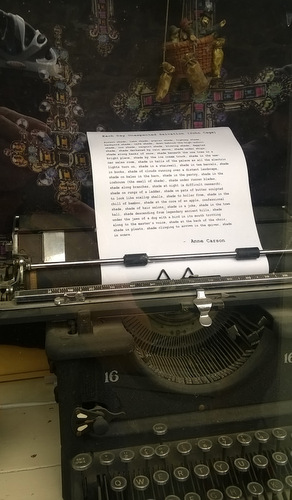|
KYSO Flash ™
Knock-Your-Socks-Off Art and Literature
|
|
|||
Pantoby David Cobb
on guard under stars Here we are in Egypt, second year after the war, Christmas coming, beetles getting fat. Five hundred young men, six beds to a bell tent, fringes of the Western Desert, pestered by nightly infiltrators who know ingenious ways of removing a tent pole behind a sentry’s back, with rifles actually chained to the pole, and the tent not collapsing. Thoughts of home.
letter from her What but the mad notion of a Christmas pantomime...Remington’s idea. HQ clerk’s typewriter, solid all round fellow, puffing out his ten-inch metal chest. Starts by cutting into a wax stencil the title, Cinderella of Sister Street. Second thoughts, that notorious Alex street may be not be fit to mention even in impolite society; patches it with the loathsome correction fluid and substitutes Cinderella Through the Looking Glass.
suds of Sunlight soap Remington’s clerk, with a pint of paraffin and a toothbrush, recently freed his mechanical accomplice from the cramps of khamsin2 dust. Is bursting now to escape from the drudgery of “daily orders,” to lay a paper-chase trail of words that don’t know where they’re going, horizontal for a bit, then slipping down onto the line beneath. Remington celebrates each plunge with a joyous ping of the little bell fixed to his backside.
melons for tiffin There’s this fundamental problem to solve: how to perform Cinderella with a cast entirely of males? Cross-dressing, okay, even traditional, for the clowns. Dame, Ugly Sisters—parts easy enough to fill, just the bait of being got off “extra duties,” fatigues, night guards, cookhouse chores, for the whole period of rehearsals, and sufficient brute soldiers will come forward, ready to dress up and look ludicrous as women of extraordinary shape. But where is the baby-faced youth, no visible hair on his goose-egg cheeks, able and willing to be passed off as a pretty girl? In the file of “daily orders,” a tip. There, with astonishing frequency, appears the name “307 Dyke.” Again and again late and unshaven on parade, always the same lame excuse; the shadow above his lip is his effort to grow a more manly face: “...but, sir, in this ’ere climate you jus’ can’t get a moustache to grow!” Promise 307 Dyke a grace period, no further persecution till the panto’s over, and then he’ll submit to powder and lipstick, trying to speak in a soprano voice.
Fairy Godfather casts spell, striking stage with wand (borrow RCM’s pace stick!) near hole specially bored (action! carpenter), stage hand lights thunder-flash (Armoury to supply!) so smoke rises and conceals... This kind of rigmarole is necessary for each change of scenery, for there are no curtains to the stage. Another magic spell. Thunder-flash. Under cover of smoke, Cinders puts on her ball attire (QM Stores to make!). Offcuts of camouflage netting, a necklace of spent .303 brass cartridge shells, smallest available pair of PE plimsolls, trimmed with gold. Enter C’s carriage... Remington, with a slick shift of carriage, makes the point: a carriage doesn’t need wheels. Better it should, though. Four? Two? One, as in wheelbarrow? Arrange with Transport Officer, despatch rider with motor bike. Twist of BSA throttle and spurt from wings. Cinders, lifting her skirts, leaps onto the pillion seat. Exit Cinderella to Prince’s ball... Remington hesitates, should the exit be left or right? Neither. Imagine the impact when the bike goes straight ahead, down a ramp into the audience’s midst. Passing her police escort, Cinderella gives him a V-salute, is whisked to the exit from the hall. Escort on tenterhooks; joins in the applause when she reappears on stage and dances with the Prince. Chimes. Twelve strokes on fire bucket with entrenching tool. Cinders exits, losing slipper. A veil is better drawn over the scene in which, to find again the girl of his dreams, the Prince asks first the two Ugly Sisters, and then Cinderella, to try on the mislaid slipper and see if it fits. Due to the heat, the slipper has desiccated and shrunk; no one is able to get it on. Like all good pantomimes, it ends with everyone in someone’s arms. Audience votes “Hilarious!” The players think “hair-raising.” Padre, sublimely innocent of all the smut, declares it was the cleanest Army show he ever saw. Is looking forward to another show quite soon. No hint of enthusiasm for that from Remington.
six men in a tent
Author’s Notes: Editor’s Note: Photographs appear with the author’s approval, and with kind permissions from the photographers. David CobbIssue 5, Spring 2016
taught English as a Foreign Language for many years and has written numerous course books for learners of English. These have been, and still are, used in classrooms in many different countries. His interest in haiku was sparked in the 1980s, and in 1990 he launched the British Haiku Society. Serious interest in the possibilities of haibun in English began in 1996 when he was a prizewinner in the Woodnotes (San Francisco) International Haibun Contest. His 5,000-word haibun, “Spring Journey to the Saxon Shore,” journal of a 100-mile bicycle ride, followed quickly on the award and has been hailed as seminal for the form. More on the Web: By, About, and Beyond⚡ Potentials of Two Different Haibun Forms: Nikki and Kikōbun, craft essay in KYSO Flash (Issue 3, Spring 2015) ⚡ Marching with Tulips and What Happens in Haibun, reviewed by Naomi Beth Wakan in Contemporary Haibun Online (Volume 9, Number 2, July 2013); in this discussion of Cobb’s recent haibun collection and its companion volume of commentary, Ms. Wakan refers to the latter as an “invaluable introduction for writers seeking to explore the haibun form.” |
|
Site contains text, proprietary computer code, |
|
| ⚡ Many thanks for taking time to report broken links to: KYSOWebmaster [at] gmail [dot] com ⚡ | |

